Click below to suggest a topic or to nominate yourself or a colleague as Lecturer.
Upcoming Webinars
Challenging reactive transport modeling from pore scale observations
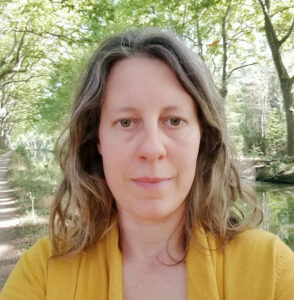
Speaker: Catherine Noiriel, University Paul Sabatier, Toulouse, France
Duration: 1 hour
Date/Time: Tuesday, April 23rd, 2024 – 4-5pm CEST
Join the Zoom Meeting: https://us06web.zoom.us/j/88187274617?pwd=eCuaRLlbXMoiCEHMaJWxNoayd3EUHS.1
Flow and transport are important in hydrology and many geo-engineering applications such as carbon dioxide storage, geothermal energy or in situ recovery. Developing a full understanding of the feedbacks between geochemical reactions and flow and transport at the reservoir scale requires investigations of geochemical mechanisms at the microscopic scale. Application of high-resolution and/or non-invasive imaging techniques like X-ray micro-tomography has considerably increased experimental capability by giving access to a spatio-temporal vision of the physical-chemical processes within the rocks [1]. New information is now accessible, which provides a better understanding of the coupled thermo-hydro-mechano chemical processes the pore scale [2,3] and allows numerical models to be better constrained. In my presentation, I will present some applications of 4D imaging related to reactive transport experiments and discuss the results and issues for reactive transport modelling. In particular, I would point out several processes that challenge the continuum description of porous media and assumptions required for reactive transport modelling at large scales [3].
[1] Noiriel C. and Renard F. (2022) 4D X-Ray Micro-Tomography Imaging of Dynamic Processes in Geosciences. Comptes-rendus Geoscience, vol. 354, 255-280, doi 10.5802/crgeos.137
[2] Noiriel C. and Daval D. (2017) Pore-Scale Geochemical Reactivity Associated with CO2 Storage: New Frontiers at the Fluid-Solid Interface. Accounts of Chemical Research, special Issue on Chemistry of Geologic Carbon Storage, DOI: 10.1021/acs.accounts.7b00019
[3] Noiriel C. (2015) Resolving time-dependent evolution of pore scale structure, permeability and reactivity using X-ray microtomography. Reviews in Mineralogy and Geochemistry, vol 80: Pore scale geochemical processes, p 247-286, C.I. Steefel S. Emmanuel and L. Anovitz Eds, DOI : 10.2138/rmg.2015.80.08
[4] Noiriel C. and Soulaine C. (2021) Pore-scale imaging and modelling of reactive flow in evolving porous media: tracking the dynamics of the fluid-rock interface. Transport in Porous Media, Special issue 35th Anniversary special issue in honour of Jacob Bear, vol. 140 (1), 201-213, doi 10.1007/s11242-021-01613-2dia
Catherine Noiriel is associate professor at University Paul Sabatier in Toulouse, France. Her research focuses on water-rock interactions, mineral reactivity, flow and reactive transport, from the experimental and numerical points of view to better understand the coupled thermo-hydro-mechanical-chemical processes (THMC) in reservoir rocks.
Past Webinars
In case you are unable to join us live, past webinars will be available for a period of 6 months.
Hydrological extremes: changing hazards as a result of climate change

Speaker: Lindsay Beevers — University of Edinburgh Research Explorer
Duration: 1 hour
Date/Time: Tuesday, April 2nd, 2024 – 4-5pm CEST
Hydrological extremes have devastating consequences on society. Climate change impacts on these hazards mean we are likely to experience more frequent extreme events. With the backdrop of increasing urbanization across the globe society faces a significant challenge in adapting to these changing hazards. This webinar will explore some of the recent research at the University of Edinburgh which seeks to understand climate change attribution for river flows, future changes to hazard frequency and magnitude as predicted by climate models, and how we might include these changes in future adaptation plans.
Leveraging Pore-Scale Physics for Enhanced Understanding of Darcy-Scale Multiphase flow and Transport through Porous Materials
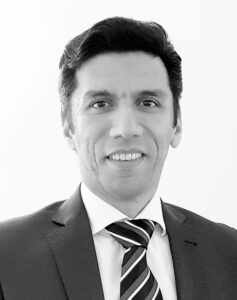
Speaker: Vahid Niasar, Department of Chemical Engineering, University of Manchester
Duration: 1 hour
Date/Time: Tuesday, January 30th, 2024 – 4-5pm CET
The study of multiphase flow and transport in porous media stands as a critical domain in understanding various natural and engineered systems, spanning from hydrocarbon reservoirs to fuel cells. Pore-scale modelling and experiments have emerged as indispensable tools in unravelling the fundamental mechanisms in two-phase flow and solute transport in porous media. This presentation presents an integrative approach leveraging pore-scale modelling techniques and complementary pore-scale experiments to elucidate the intricacies of two-phase flow and transport in porous media. The synergy between advanced numerical simulations and experimental observations allows for a comprehensive investigation into the dynamics of fluid-fluid displacement, capillary effects, wettability, and solute transport within the complex pore structures.
They key areas covered in this talk include capillary phenomena, single-phase and two-phase solute transport in Newtonian and non-Newtonian fluids.
Modeling of flow and deformation in fractured formations
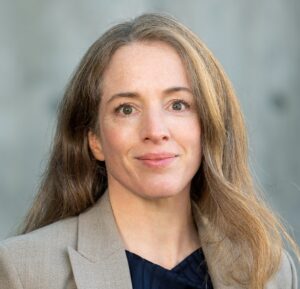
Speaker: Inga Berre, University of Bergen
Duration: 1 hour
Date/Time: Tuesday, October 10th 4pm CEST
Fractures are mechanical breaks implying material discontinuity across surfaces or narrow zones in a formation. These have a strong impact on flow, deformation, and transport processes. The structural impact the fractures have on the processes, as well as the highly coupled nature of the dynamics, leads to challenges in the development of simulation models. Motivated by processes caused by both injection and production and natural convection in geothermal systems, this webinar will provide an introduction to modeling of coupled subsurface processes in fractured formations. A focus will be on the interplay between shear and tensile fracture deformation, deformation of the porous medium surrounding the fractures and fluid flow and heat transfer. Numerical examples will illustrate the concepts for processes related to injection and production operations in geothermal reservoirs and related to natural hydrothermal convection in the roots of hydrothermal systems.
Underground H2 storage – enabling a H2 economy at scale
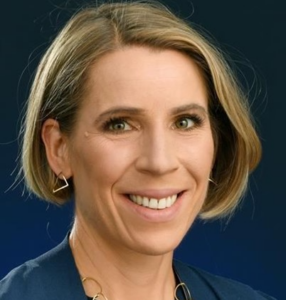 Speaker: Dr. Karin de Borst, Shell Global Solutions International B.V.
Speaker: Dr. Karin de Borst, Shell Global Solutions International B.V.
Duration: 1 hour
Date/Time: Tuesday, May 9th 4pm CEST
Hydrogen is considered a key enabler of a net-zero emission energy system. It provides a balance between energy supply and demand over possibly long distances and periods of time and, thus, allows introduction of a higher share of renewable energy sources in the overall energy mix. Offering a balancing mechanism to the energy system will require large-scale storage of hydrogen, which can be most cost-effectively realized in the subsurface using mined salt caverns, depleted reservoirs, or aquifers. This webinar will provide an introduction to H2 subsurface storage technologies and highlight the critical role of the geosciences and petroleum engineering in their de-risking and further development. It will address performance characteristics, remaining challenges, suitable geological resources, and ongoing piloting activities and commercial-scale developments.
Flow and transport coefficients in porous media: from direct simulation to automated prediction.
 Maša Prodanović is a Frank W. Jessen Professor in Hildebrand Department of Petroleum and Geosystems Engineering (PGE) at the University of Texas at Austin. She is an applied mathematician-turned-engineer and has expertise in direct simulation of flow and particulate transport in porous and fractured media, porous media characterization especially based on 2D and 3D images of rock microstructure, unconventional resources and data curation. Permeability, diffusion coefficients or electrical resistivity of porous media containing multiple fluids phases are important in hydrology, enhanced oil recovery, energy storage or micro-vascular networks. Direct simulation combined with images (e.g. X-ray or scanning electron microscopy) provides a way to compute them in a specific porous media case regardless of its complexity.
Maša Prodanović is a Frank W. Jessen Professor in Hildebrand Department of Petroleum and Geosystems Engineering (PGE) at the University of Texas at Austin. She is an applied mathematician-turned-engineer and has expertise in direct simulation of flow and particulate transport in porous and fractured media, porous media characterization especially based on 2D and 3D images of rock microstructure, unconventional resources and data curation. Permeability, diffusion coefficients or electrical resistivity of porous media containing multiple fluids phases are important in hydrology, enhanced oil recovery, energy storage or micro-vascular networks. Direct simulation combined with images (e.g. X-ray or scanning electron microscopy) provides a way to compute them in a specific porous media case regardless of its complexity.
Read the full abstract here.
Duration: 1 hour
Date/Time: January 10, 2023, at 9am CST (4pm CET)
There was a lively Q&A and we did not get to all questions during the webinar. Please see here for additional answers from Masa.
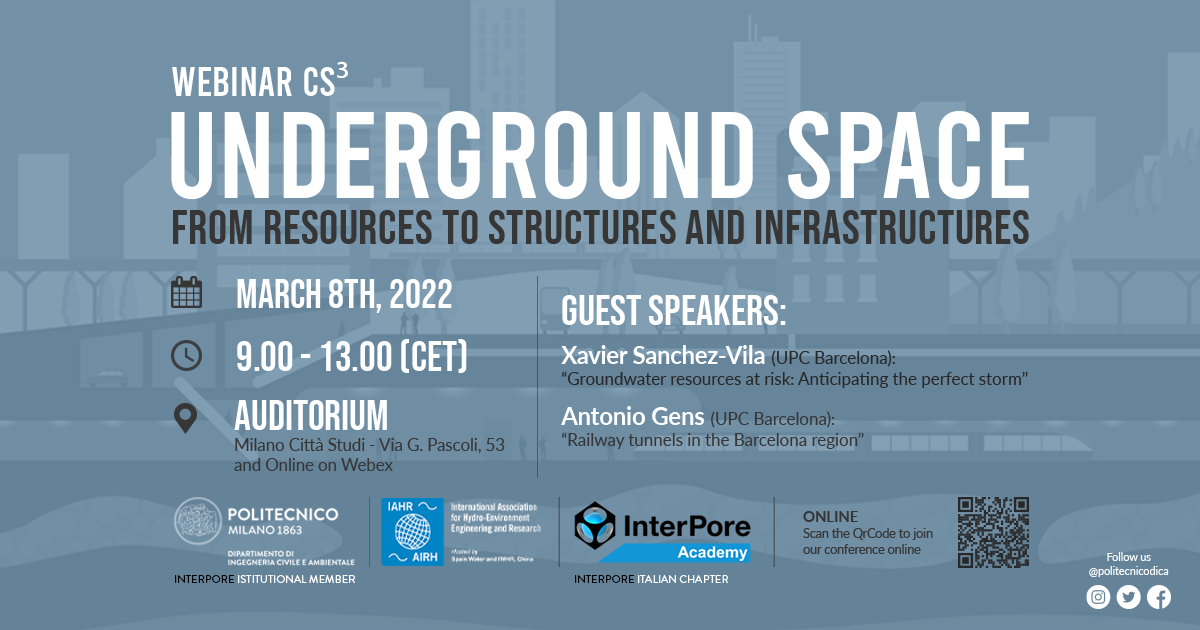
The Department of Civil and Environmental Engineering of Politecnico di Milano (Polimi) has a long-standing tradition of organizing a variety of workshops keyed to the main research topics of the Department, CS3@DICA being the latest edition of these events.
The CS3@dica event is scheduled on March 8th 2022 and is focused on aspects and perspectives related to “Underground space: from resources to structures and infrastructures”. Polimi is institutional member of InterPore and the event is framed in the context of the InterPore Italian Chapter as well as the InterPore Academy.
The webinar spotlights recent activities, aimed at planning and designing structures and infrastructures systems in the underground. These are set in the context of a sustainability-driven approach driven to manage and protect underground resources, with a specific focus on groundwater and energy.
The webinar will host two guest speakers from the UPC BarcelonaTech: Prof. Antonio Gens and Prof. Xavier Sanchez-Vila. Their lectures focus on tunneling and groundwater resources at risk, respectively.
The Department has also promoted an award recognizing an outstanding poster contribution delivered by PhD candidates and young researchers with the aim of acknowledging their commitment to excel in a national and international scenario through favoring broad exposure of their research activity. All posters are available on the Department website (www.dica.polimi.it) together with the associated video presentation.
Webinar Program:
9.15-9.30 Alberto Guadagnini – Welcome
9.30-10.15 Xavier Sanchez-Vila – Groundwater resources at risk: Anticipating the perfect storm
Click here to download the full version of the Webinar Program.
Facemasks & Respirators – Technology, Manufacturing & Performance
 Speaker: Dr. Behnam Pourdeyhimi, The Nonwoven Institute, North Carolina State University
Speaker: Dr. Behnam Pourdeyhimi, The Nonwoven Institute, North Carolina State University
Date: Wednesday, April 7, 2021
Time: 10:00 AM EDT / 4:00 PM CEST
From the Brain to the Fuel Cell – Porous Media Are Everywhere
 Speaker: Dr. Rainer Helmig, University of Stuttgart
Speaker: Dr. Rainer Helmig, University of Stuttgart
Date: Wednesday, March 24, 2021
Time: 3:00 AM EDT / 8:00 AM CET
Contact: assistant-academy@interpore.org


